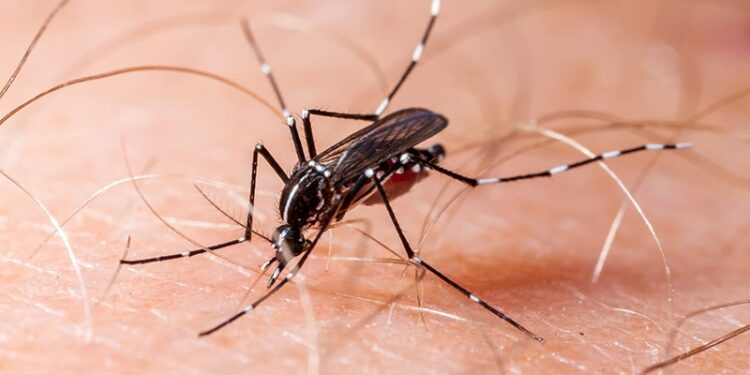Genetic fragments of the West Nile virus (WNV) have been detected in mosquitoes in the UK for the first time during a national surveillance programme.
The virus was identified in two samples of the Aedes vexans species of mosquito collected in July 2023 from wetlands on the River Idle near Gamston in Nottinghamshire.
These results are part of the Vector-Borne RADAR (Real-time Arbovirus Detection And Response) programme, which uses polymerase chain reaction testing to detect zoonotic, mosquito-borne viruses in the UK. The programme is run by the UK Health Security Agency (UKHSA) and the Animal and Plant Health Agency (APHA).
The UKHSA said that more than 30,000 mosquitoes and 300 birds from high-risk areas of England were tested in 2023 and 2024. All other samples tested negative.
Detection of WNV in mosquitoes in the UK is “not unexpected,” according to Dr Meera Chand, deputy director at the UKHSA, who explained that the virus is already widespread in Europe.
“The risk to the general public is currently assessed as very low,” she added.
Migratory Birds May Have Brought WNV to UK
WNV is a vector-borne disease of the Flaviviridae family, which also includes the viruses that cause dengue and yellow fever. It is usually found in birds and typically circulates through bird-biting mosquitoes.
Professor Grant Hughes, from the Department of Vector Biology at the Liverpool School of Tropical Medicine, told the Science Media Centre: “The virus potentially entered the UK via migratory birds.”
In rare cases, mosquitoes can transmit the virus to humans or horses. However, there have been no cases of locally acquired WNV detected in humans or horses in the UK to date, the UKHSA noted.
James Logan, professor of medical entomology at the London School of Hygiene & Tropical Medicine, said, “the detection of the virus in mosquitoes marks a significant step in that direction.”
Most people infected with WNV are asymptomatic or present with mild influenza-like symptoms that resolve within a few days. However, a small number of cases — fewer than 1% — develop more severe illness, including encephalitis.
The UKHSA has issued advice to healthcare professionals to consider WNV testing for patients with unexplained encephalitis. Testing is available through the UKHSA’s Rare and Imported Pathogens Laboratory.
Nuisance Biting
A vexans is native to the UK and, although uncommon, can occur at high densities in river floodplains and lakes. They are known to cause considerable nuisance biting to humans where aquatic areas are close to habitation.
“Mosquitoes breed in a range of natural wetlands, but can also be common in gardens – breeding in container habitats like water butts and buckets,” highlighted Dr Jolyon Medlock, head of medical entomology and zoonoses ecology at the UKHSA.
The agency encourages the public to report unusual mosquito activity via its mosquito surveillance scheme .
Climate Changes
WNV is endemic in parts of Africa, Asia, the Americas, and southern Europe.
Its range has expanded in recent years, reaching more northern and western parts of Europe.
The UKHSA’s 2023 report on climate change and health warned that climate change could lead to mosquitoes carrying dengue fever becoming established in parts of southern England by the middle of the century.
“The detection of West Nile Virus in the UK is part of a wider changing landscape where, in the wake of climate change, mosquito-borne diseases are expanding to new areas,” said Dr Arran Folly, arbovirologist at the APHA and lead of the Vector-Borne RADAR programme.
Professor Matthew Baylis, chair in veterinary epidemiology at the University of Liverpool, called for increased surveillance in mosquitoes, birds, and humans.
For now, the UKHSA advises that the main risk to UK residents remains travel to countries where WNV is endemic.
Dr Rob Hicks is a retired NHS doctor. A well-known TV and radio broadcaster, he has written several books and has regularly contributed to national newspapers, magazines, and online. He is based in the UK.
Source link : https://www.medscape.com/viewarticle/west-nile-virus-found-uk-mosquitoes-first-time-2025a1000cv4?src=rss
Author :
Publish date : 2025-05-21 19:08:00
Copyright for syndicated content belongs to the linked Source.














